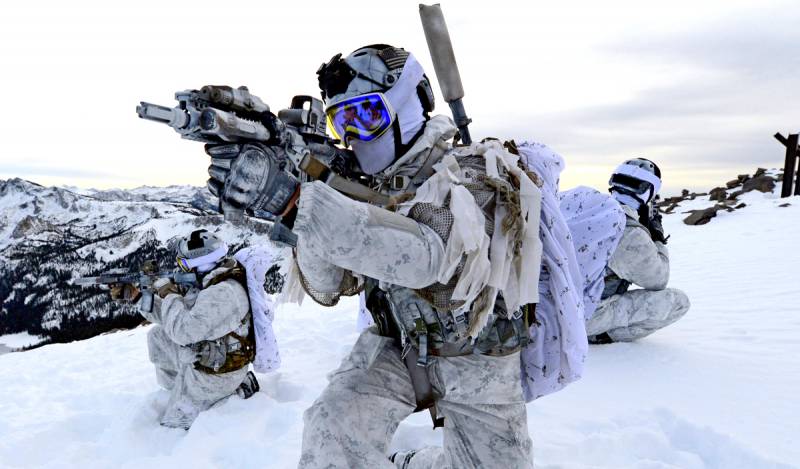Why US Marines Train in Norway with Alaska
Norway is the most important militarypolitical US partner on the northwestern approaches to Russia. As a member of NATO, Norway plays a key role in the strategy of building up the US military presence in the Arctic, and precisely at the Russian borders. Now Washington is about to double the size of the US Marines in Norway. At present, 330 US Marine Corps Corps troops are stationed in Norway, and another 300 Marines are expected to arrive.
A contingent of 330 US marines first arrived in Norway on January 16, 2017. Prior to that, the foreign military in Norway did not constantly deploy, they came only for joint exercises. Since 1949, Norway has been pursuing a non-deployment strategy for foreign military personnel on its territory, although it is a member of NATO. The policy of non-deployment contributed to a balance of power, even during the Cold War, US troops were not stationed in Norway. Although in 1981, warehouses were built for weapons and military equipmentdesigned specifically for the needs of the US Marine Corps. But a change in the global political situation has made adjustments to Norwegian-American cooperation. By the way, since there is a constant rotation of the personnel of the marines, officially the United States and Norway do not recognize their presence as a permanent deployment.
The formal reason for the presence of the US Marines in Norway is the development of skills in the difficult climatic conditions of the Arctic. Given that the United States is one of the strongest powers in the world, its marines really need to be able to act in a variety of situations and in a very different climate. But the USA also has its own territories with a similar climate, for example, the same Alaska. What is stopping the training of marines in Alaska, where they too can learn how to act in extremely cold climates?
Obviously, the presence of the US Marines in Norway is directed precisely against Russia as its closest neighbor. Recently, the United States is seriously concerned about the issue of building up its military power in the Arctic region. Of course, neither 330 nor 630 marines will be able to take aggression against Russia, but they can become the basis for the deployment of more powerful contingents. It is possible that in this way Washington “breaks through” Moscow’s reaction to building up its military presence.
In March 2018, the analysis and planning department of the U.S. Department of Defense Intelligence Directorate recommended transferring P-8 Poseidon anti-submarine aircraft to the Norwegian air force base on Anneya Island in the Norwegian Sea, as well as ensuring the presence of 20 U.S. air force fighters at airfields in the northern part of the country. The Pentagon plans to spend $ 12 million to solve this problem. Thus, with the transfer of new marines, the buildup of the American military presence in Norway will not stop, and this only means that Russia also needs to prepare for retaliatory measures and strengthen its armed forces in the Arctic.
A contingent of 330 US marines first arrived in Norway on January 16, 2017. Prior to that, the foreign military in Norway did not constantly deploy, they came only for joint exercises. Since 1949, Norway has been pursuing a non-deployment strategy for foreign military personnel on its territory, although it is a member of NATO. The policy of non-deployment contributed to a balance of power, even during the Cold War, US troops were not stationed in Norway. Although in 1981, warehouses were built for weapons and military equipmentdesigned specifically for the needs of the US Marine Corps. But a change in the global political situation has made adjustments to Norwegian-American cooperation. By the way, since there is a constant rotation of the personnel of the marines, officially the United States and Norway do not recognize their presence as a permanent deployment.
The formal reason for the presence of the US Marines in Norway is the development of skills in the difficult climatic conditions of the Arctic. Given that the United States is one of the strongest powers in the world, its marines really need to be able to act in a variety of situations and in a very different climate. But the USA also has its own territories with a similar climate, for example, the same Alaska. What is stopping the training of marines in Alaska, where they too can learn how to act in extremely cold climates?
Obviously, the presence of the US Marines in Norway is directed precisely against Russia as its closest neighbor. Recently, the United States is seriously concerned about the issue of building up its military power in the Arctic region. Of course, neither 330 nor 630 marines will be able to take aggression against Russia, but they can become the basis for the deployment of more powerful contingents. It is possible that in this way Washington “breaks through” Moscow’s reaction to building up its military presence.
In March 2018, the analysis and planning department of the U.S. Department of Defense Intelligence Directorate recommended transferring P-8 Poseidon anti-submarine aircraft to the Norwegian air force base on Anneya Island in the Norwegian Sea, as well as ensuring the presence of 20 U.S. air force fighters at airfields in the northern part of the country. The Pentagon plans to spend $ 12 million to solve this problem. Thus, with the transfer of new marines, the buildup of the American military presence in Norway will not stop, and this only means that Russia also needs to prepare for retaliatory measures and strengthen its armed forces in the Arctic.

Information